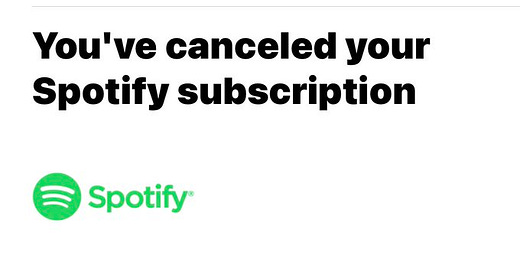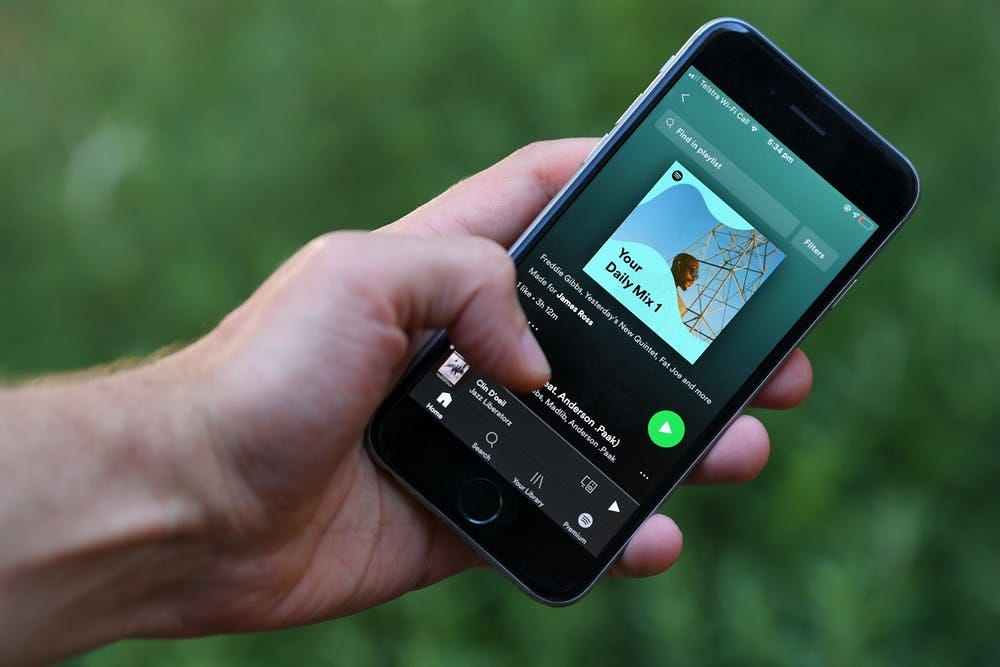In the event you’ve been bingeing the fourth season of Ozark this week (and yes, it is spectacular) and haven’t had time to read about the kerfuffle over at Spotify, let me fill you in on the details. The truth is, there are few things we at Cappuccino enjoy more than a moral gray area, and this area is so gray, it should apply for an AARP card.
First, what is Spotify? In a nutshell, Spotify is an app you can download to your phone that allows you to listen to any of 70 million songs or 3.2 million podcasts. You read that correctly—70 million. As a listener, you have two options: compiling your playlist with all the annoying ads thrown in, or subscribing to the service for about ten bucks a month and no ads.
Erstwhile comedian and now Libertarian “chat bro” Joe Rogan has a popular podcast on Spotify called The Joe Rogan Experience. The exclusive rights to that “experience” cost Spotify more than 100 million dollars, which underscores just how Libertarian those tech bros are over there in Silicon Valley. They love all that anarchist “burn the system” fever-swamp hoodoo until it affects their profit margins. Then they go full-on Sith Lord.
A recent graduate of Google Medical School, Mr. Rogan doesn’t believe in the efficacy of vaccines, and has said as much on his program. This position may or may not be related to his public support for former U.S. president Donald Trump, since Trump was, until recently, a well-known anti-vaxxer. During an April 23, 2020, presser, the former president recommended that the American public inject bleach into its veins to combat the virus, which gives you some idea of the ideological company Mr. Rogan keeps.
With that in mind, it is little wonder that Mr. Rogan booked biochemist/immunologist Robert W. Malone on his show. Malone is a rabid anti-vaxxer who, on Mr. Rogan’s December 30, 2021, podcast accused the American public of “mass formation psychosis” regarding Covid-19 and then went on to equate this kind of group-think with the rise of Nazi Germany.
In January, 2022, 270 doctors, scientists, and physicians wrote an open letter to Spotify expressing their concern over “false and societally harmful assertions” made on The Joe Rogan Experience. They asked Spotify to establish a “clear and public policy to moderate misinformation on its platform.” In previous broadcasts, Mr. Rogan, who contracted Covid-19 in late August/early September of 2021, was a proponent of the controversial anti-parasitic drug, Ivermectin, a favorite “alternative therapy” among the anti-vaxx crowd. Unfortunately, Ivermectin has not proven effective in the treatment of Covid-19 or any of its mutations. However, this hasn’t stopped Mr. Rogan from disseminating that, and a lot of other half-baked theories about combating the virus.
Then on January 24, 2022, musician Neil Young issued an open request to Spotify to remove his music if they did not suspend Mr. Rogan’s podcast from their streaming service. Young wrote that “Spotify has a responsibility to mitigate the spread of misinformation on its platform.”
Since this courageous and principled stand, other artists have followed suit: Joni Mitchell, India Arie, Graham Nash, Nils Lofgren, and bestselling author Brené Brown. Spotify’s market share has plummeted. Their response? So far, they’ve doubled down on Mr. Rogan’s First-Amendment-bro rights to free speech, although other folks who are equally enamored of their rights to free speech are quick to point out that saying, “I hate woke culture” is a whole lot different than telling people “Vaccines are dangerous,” or “Ivermectin cured my Covid.”
One might safely argue that giving up $5 billion in market cap by paying Mr. Rogan $100 million to air his uninformed opinions is hardly good business. But Spotify’s problematic history goes deeper than that. Far deeper. It’s the real reason I wrote this article, and it has to do with the nature of the service itself.
While Mr. Rogan and others like him are making hundreds of thousands of dollars on Spotify, artists are paid .003 cents—a third of a cent, not even a full penny—every time one their songs is streamed. That’s 350 plays to make one dollar, and if that artist’s work is under contract with a music label (e.g., Sony Music), then up to 100% of that dollar goes to the label. Most labels, at this point, are part-owners of Spotify.
Cozy, wouldn’t you say?
In Spotify’s uber-Libertarian world, music labels are under no contractual obligation to pay a specific percentage of Spotify royalties to artists. And since music labels are notoriously grasping and have never been known to pay talent fairly, particularly Black talent, this practice is allowed to continue. And most musicians, especially non-famous ones, have no choice but to get into this reeking sandbox of greed and coercion. They need Spotify for the exposure.
Few musicians are even signed to labels these days, and labels are hemorrhaging money because of piracy. How else can any musician who isn’t Adele or Taylor Swift (both of whom hate Spotify and are the only artists famous enough to eschew it) gain a following?
But it’s worse even than that.
Although Spotify denies the accusation, multiple insiders claim that Spotify’s owner, Daniel Elk, pays producers to create music within specific genres. These producers receive a non-royalty or “flat” fee for their efforts, including studio musicians, while Spotify retains the copyright. Then—here’s the part that you just can’t help but wish hell would rumble open up for—Spotify publishes those tracks under fake artist names. As in, these artists don’t actually exist. As in, Spotify creates some kind of giggly blonde pop-tart out of Artificial Intelligence, gives it a name and a fake bio, and then aggressively markets it on the platform, all while turning a deaf ear to the groans of anguish from human bandmembers who are selling crotch shots on Only Fans just to eat.
To be fair, there was a certain inevitability to all this. Before Spotify, the music industry was on a ventilator. Worldwide revenue from recorded music fell from $37 billion in 1999 to $25 billion in 2007, digital sales included. Much of that is due to global piracy.
It’s interesting to track the milestones that got us to this point.
First, there was live music, like that played in opera houses across 19th century Europe. Then came the invention of the phonograph, which people mistakenly believed would put live musicians out of business. Wax and/or vinyl records enjoyed a heyday for the better part of a century, and then came 8 track tapes, a recording technology whose popularity lasted from the mid sixties to the early eighties. After 8 tracks, there were cassette tapes. From cassette tapes, we went to CDs. From CDs to streaming. The only thing that’s changing now isn’t the technological means of music delivery; it’s the platform itself.
And yet, the “democratization” of music has flooded the market with un-curated musical content, not all of it wonderful. In the face of so many overwhelming choices, consumers are sticking closer than ever to their Adeles and Taylor Swifts, making new artists ever more desperate to get their attention. Spotify’s algorithm, called “Echo Nest” is supposed to recommend music like the kind you usually listen to (Amazon has a similar feature for books), but so far, results have been disappointing.
In a shameless attempt to gin up more revenue, Spotify now demands that artists pay a fee to be added to the algorithm. It’s the equivalent of handing a loaf of bread to a bunch of starving, wild-eyed Bolsheviks and then charging them for use of the plate.
Has Spotify cheapened music? I think most of us would say yes. Is there any way to stop piracy from occurring, which might compel music labels to sign new artists? It’s doubtful. Anything that’s heard or seen can be recorded and shared online. That horse is out of the barn forever, I’m afraid.
In a world where the consumer wins (70 million free songs!) and the artist loses (“Oh, look, the rent just went up again.”), it’s hard to get people to circle the wagons. Doing what’s right requires a high degree of understanding and empathy, and frankly, both seem to be in short supply these days. But I do feel as though the non-payment of musicians is an injustice that must be redressed by the same people whose piracy, intentionally or not, partly caused it.
If enough Spotify listeners cancel their subscriptions, delete the app, and then tweet their demands (fair and equitable pay for artists), Spotify will have no choice but to pressure music labels into doing the right thing.
Now seems like a propitious moment to do that. Consumers are making their voices heard. Spotify can force music labels to fairly compensate artists or it can became what Radiohead’s Thom Yorke called it, which was “the last desperate fart of a dying corpse.”
If you’re onboard with this, here’s a way to cancel Spotify and export your playlists.
Let’s get busy.
What are your thoughts on Joe Rogan and/or Spotify? I want to hear from you! Please leave your comments below.






I'm working with a new game in town, that will pay its content creators for the majority of what they create, VEO, http://www.veoworld.org/. It won't stop misinformation disseminators like Rogan. But will give the actual content creators more money for their work, like musicians.
A good portion of the world encourages bad actors like Rogan right now so not sure what we can do except not listen to that shit. I don't subscribe to Spotify.
I've always despised Spotify for its egregiously exploitative business model. I've never paid them a dime and never will. Then again, I get my music from Apple Music, which isn't appreciably better, but at least isn't so nakedly exploitative. It's hard to feel good about listening to music these days and knowing that the artists behind it are getting hosed.